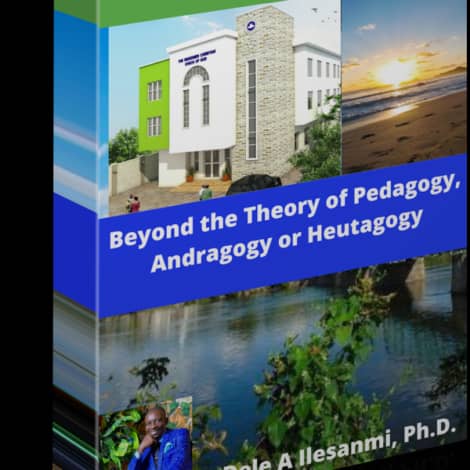Pneumagogy as a Theory of Teaching and Learning in Christian Education
- By Pastor Dele Ilesanmi, PhD
- Published in Christopress Blog



The term “Pneumagogy” was first used by Dele Ilesanmi in 2021 in his Ph.D. thesis when he writes:
“The authentic Christian Education should be theocentric, christocentric and pneumatocentric. Besides, teaching and learning should be put under the leadership and control of the Holy Spirit which this author calls “pneumagogy”[1].
In his work, Dele Ilesanmi cited William Dennis to describe the concept of the term “pneumagogy” thus:
Christian education is Christian when teachers and learners are dependent on the work of the Holy Spirit in the learning environment. It is Christian when the purpose and goals are honoring to the Lord and to his kingdom. It is Christian when the curriculum is developed from the teachings of the Word and from an understanding of biblical theology. It is Christian when there is an overall understanding and perspective that God is in control and that teachers and learners are sincerely seeking to fulfill his will and purpose in all things.[2]
In his own view, Walter Norvel writes:
The Holy Spirit work is the transformational agent in the teaching-learning process. The Holy Spirit works through teacher, learner, environment, methods, and content (the Bible). He brings both conversion and maturation (a process) to the disciple of Jesus.
Given the above quotations, without the Holy Spirit, the word is powerless. One can speak, and one can quote the word of God but without being ignited by the power of the Holy Spirit the word becomes useless and ineffective. Thus, “Christian education” becomes “ordinary or secular education” without the Spirit of God.
Teaching-learning process in Christian education is empowered or enabled by the Holy Spirit. Hence Pnuemagogy is the Holy Spirit-centred theory or the Holy Spirit-directed approach that provides divine or spiritual empowerment learning that transmits true or divine information from God through His Word and a spiritual teacher to a student (and/or a spiritual student) under the control of the Holy Spirit. We can simply define Pneumagogy as the art of leading people through teaching (preaching, training, coaching, mentoring, etc.) under the direction or control of the Holy Spirit. It is the method of teaching and practice in Christian (theological) education. It concerns how the teacher teaches and how the student learns in theory and in practice without relying on his/her knowledge but depending solely on the Holy Spirit. It is an approach to teaching, is the theory and practice of learning, or the act of teaching. The theory of pneumagogy identifies the teacher as an intermediary, the student as a recipient, and the Holy Spirit as the knowledge Holder and Dispenser. Here, the theory views the teacher as a “placeholder”. The real teacher is the Holy Spirit[3].
This theory is based on the following five biblical theological theories/facts:
God or Christ-centredness: All instructions must be God/Christ-centred for a person fulfil the purpose of God for his/her life. All thoughts, knowledge, teachings, or instructions must be subject to the obedience of Christ our God.[4] All our children must be taught by God[5] because the earth must be filled with the knowledge of Him[6]. Only God can give true wisdom, knowledge, and understanding[7], and the Holy Spirit remains as the Teacher[8]. The major function of the teacher is to relate to the Master Teacher, our Lord Jesus Christ.
The Word of God or Biblicality: Learning must be rooted in the Word of God. Any instruction or teaching that is not rooted in the Word of God cannot be considered true or genuine learning. This is because the written Word or the Scripture is given to man by God through His inspiration for teaching, training, mentoring, coaching, instruction, reproof, and correction, in righteousness so that the children of God will be perfect, well-informed, skillful, intelligent, holy, and thoroughly prepared, furnished or equipped unto all good works[9]. Jesus confirmed that the Word belongs to the Father[10]. Therefore, the word must be appropriated by the teachers to facilitate the teaching-learning process to engender better life for themselves and their students. This, will, in turn, positively better a lot of society. Therefore, learning and teaching must be Bible-based.
Holy Spirit-enabling/ centredness: As a person grows up, he/she must learn how to depend on the Holy Spirit who teaches all things and brings all things to our remembrance[11]. The Holy Spirit is the third person in the Trinity. He is God living in us. He is the Teacher of this dispensation. Thus, He must not be ignored in the teaching-learning environment. No Christian educator can successfully impart lives without the help of the Holy Spirit. He is the Spirit of the truth; He lives in us, and He is with us[12]. The role of the Holy Spirit cannot be underrated in the teaching-learning environment. He does many things: He teaches; He empowers; He helps; He brings things to our remembrance; He guides; He leads; just to mention a few. With this in mind, no spiritual man or teacher can ignore Him. Any education that is not under the control of the Holy Spirit will cause the receiver confusion, calamity, unrest, and sorrow. The Holy Spirit is the Teacher. The maxim that “experience is the best teacher” is not true. No doubt, experience has its place, it cannot teach you all things but the Holy Spirit can. Therefore, He, the Holy Spirit is the best Teacher.
Prayer: prayer is vital to the success of the teaching-learning process in Christian education. Prayer is communication with God which includes praising and worshipping God in spirit and in truth (John 4:23-24) and asking God your desires in the name of Jesus (John 14:13-14). Asking God for wisdom, knowledge, and understanding will help to receive the correct interpretations of God’s word. This will help both the teachers and students to enjoy similar wisdom and understanding God gave to Solomon ( 1Kings 4: 29-34; 5: 12) and the excellent spirit, knowledge, and understanding He gave to Daniel ( Dan.1:20; 5: 12, 14; 6:3). Only God can give true wisdom, knowledge, and understanding, and this sound, true wisdom is for the righteous (Prov.2: 6, 7). Therefore, we need to ask God for this in prayer (Matt.7:7). Prayer is essential to the teaching-learning process.
Faith: This is the vehicle that we need every day of our life for our desires to be accomplished and to please our Maker, God (Heb.11:6). It is through faith that the worlds were framed by the word of God (Heb.11:3). It is a vehicle that conveys the word of God to its destination when appropriated. It retains the word of God in the hearts of the students/ congregation. It helps us to apply our knowledge rightly through the power of the Holy Spirit. No success can take place in the teaching-learning environment without faith-filled words and the Holy Spirit’s empowerment. Christian learning environments must be faith-filled before a successful teaching-learning process can take place.

Footnotes
[1] Dele Ilesanmi(2021) titled his unpublished Ph.D. Thesis “An Evaluation of Accountability in Christian Education in the Redeemed Christian Church of God, Nigeria” P.18
[2] Dele Ilesanmi(2021), op. cit.p.6
[3] John 14: 26
[4] 2Corinthians 10:5
[5] Isaiah 54:13
[6] Hebrew 2:14; Isaiah 11:9
[7] Proverbs 2:6, 7
[8] John 14: 26
[9] 2Timothy 3: 16-17
[10] John 14: 24
[11] John 14:26
[12] John 14: 17
Share this:

